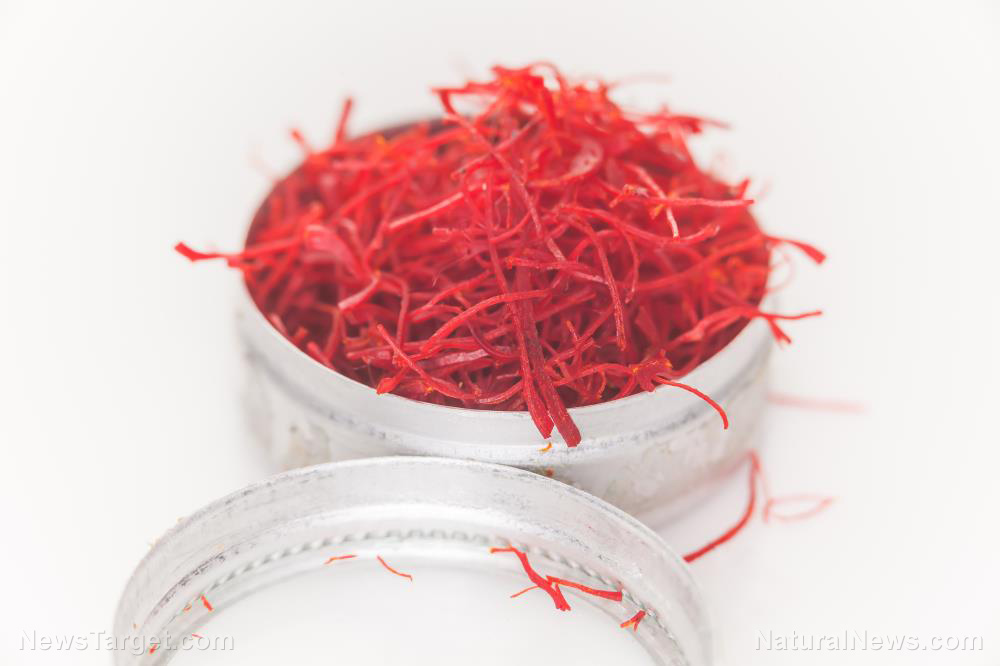The evidence is clear: Saffron is a scientifically-proven therapeutic spice that can treat a variety of diseases
10/03/2018 / By Ellaine Castillo

With its characteristic red color and its subtle yet recognizable taste, saffron is one of the most well-known spices in the world. However, it is also one of the most expensive. Fortunately, the many health benefits of saffron make it worth the price.
The expensive price of saffron is attributed to its extremely limited production and difficult harvesting process. Most saffron on the market are imported from countries like Iran, Greece, Morocco, and India where they are individually picked by hand. Each thread of saffron corresponds to one stigma from Crocus sativus, which can only produce three stigmas each. It takes approximately 150 flowers to produce just one gram of saffron.
One thread of saffron is not just filled with flavor and color, it is also packed with multiple health benefits. Since ancient times, it has already been used for traditional medicine, as indicated by paintings involving saffron-derived drugs. These medicinal properties can be attributed to the presence of over 150 biochemical compounds. The following are health benefits that can be acquired from saffron:
- Weight loss – Most of the interest in saffron comes from its ability to promote weight loss. It has been observed that saffron reduces appetite and cravings, possibly by increasing serotonin levels in the brain. High levels of serotonin have been proven to prevent compulsive overeating, as shown by a trial conducted with healthy, mildly overweight women. Participants who were given saffron experienced a greater decrease in snacking, as well as a reduction in body weight.
- Mood improvement – The symptoms of depression can also be alleviated in people who eat saffron or take saffron supplements as a result of the aforementioned increase in serotonin levels. Serotonin is a neurotransmitter that plays a role in appetite, as well as emotions and motor, cognitive, and autonomic functions. Previous studies have shown that 15 mg of saffron has comparable effects to 10 mg of Prozac, a commonly used drug for depression. Additionally, 30 mg of saffron has the same effects as 100 mg of imipramine, another depression medication.
- Alzheimer’s disease management – Drugs for patients with Alzheimer’s, such as Aricept, have been shown to be toxic and capable of inducing harmful side effects. Fortunately, saffron has been proven to be just as effective as these drugs without causing any side effects.
- Pre-menstrual syndrome relief – Many women experience symptoms of pre-menstrual syndrome, which can range from emotional to physical changes. For some, these symptoms are so intense that they interfere with life. Researchers have discovered that taking saffron supplements significantly reduces the occurrence and intensity of these symptoms.
- Cancer prevention – A compound found in saffron called crocetin has been shown to have anticancer properties. Crocetin was observed to inhibit the proliferation of lung and cervical cancer cells in vitro. This is possibly caused by inhibition of enzymes that are overactive in cancer cells.
- Psoriasis treatment – Psoriasis is caused by an increased concentration of toxins in the body, which can occur due to leaky gut syndrome. People with leaky gut syndrome have damaged intestinal walls that allow pathogens and wastes to circulate in the bloodstream. Taking saffron tea repairs the intestinal walls and detoxifies the body by promoting sweating and opening of pores. Aside from these, saffron also boosts circulation to ensure that organs get the supply they need to function.
- Blood pressure control – Previous studies have shown that dietary saffron can prevent blood pressure from rising through its arsenal of hypotensive compounds, which includes crocin and safranal.
The many health benefits exhibited by saffron make it an important food to include in a person’s diet. Additionally, saffron could also be developed and used as a safe and effective alternative for synthetic drugs and treatments with unwanted side effects. (Related: One of the most precious spices in the world, saffron can be used as an alternative cancer treatment.)
Learn more about the different health benefits of saffron by visiting NaturalCures.news today.
Sources include:
Submit a correction >>
Tagged Under:
This article may contain statements that reflect the opinion of the author
RECENT NEWS & ARTICLES
COPYRIGHT © 2017 SUPER FOODS NEWS





















